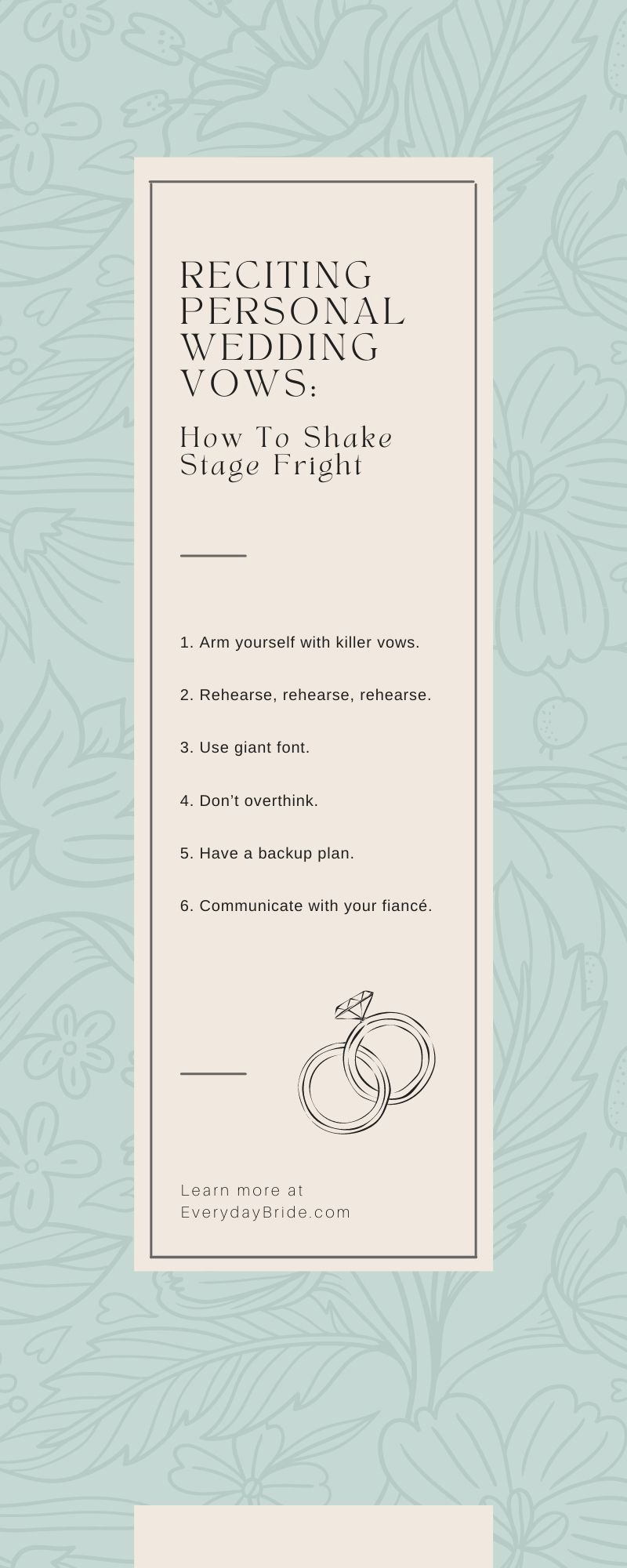Your wedding plans are in full swing, and a few minor hiccups aside, things are unfolding surprisingly smoothly. That is, until your fiancé suggests something that you feared was coming but hoped to avoid—writing your own vows. Not wanting to disappoint, you agree. But as your wedding day approaches, you find yourself waking up in a cold sweat night after night with visions of yourself staring down at a grocery list instead of your vow script, your guests’ laughter reverberating through your mind in haunting slow motion. Or worse, you’re holding the right script but can’t see the words through your tears which can only mean one thing—you’re ugly crying!
Before you lose more sleep and start resenting your soon-to-be-spouse, pump the brakes on your panic attack with a few simple stage fright hacks.
1. Arm Yourself With Killer Vows
Public speaking may not be your jam, but bringing a mediocre set of vows to the table isn’t going to help your cause. Having confidence in what you are communicating is key to successful delivery. And if writing isn’t your forte, hire a professional vow writer to pinch-hit for you. There are a number of writers, myself included, who specialize in vow composition. If done correctly, your guests (and partner!) will never know you had a helping hand.
2. Rehearse, Rehearse, Rehearse
It may seem obvious, but once you have a perfect script, you should practice as much as possible. Carry your vows in your pocket, save them to your phone, write them on the bottom of your shoes—whatever it takes to have them handy all the time. If you find yourself in a long check-out line, read them over. Waiting on hold with the cable company? Read your vows to the tune of whatever terrible music they’re playing. Waiting for the conditioner to set in when showering? Recite whatever you can remember. By the time your wedding rolls around, it may not matter if you accidentally bring your grocery list instead of your vows; you’ll already have them memorized!
3. Use Giant Font
Even if you think you can recite your vows in your sleep, you should bring a paper backup. It is not necessary or even advisable to recite your vows from memory. There’s always a chance you will freeze, and it’s very hard to regain composure with a blank brain. Choose as large a font as possible. You’re less likely to lose your place if the words are prominent and well-spaced. And print on thick card stock so that your paper doesn’t flop around while you’re reading; this is especially beneficial if your wedding is outdoors and subject to wind.
4. Don’t Overthink
Yes, you might cry. Yes, you might lose your place. Yes, you might grab your grocery list instead of your vows (though this is far less likely if you print on card stock as suggested). But, like anything in life, anticipating the worst scenario isn’t worth all that emotional energy. Remember that your audience consists of your closest friends and family. These are people who are rooting for you and aren’t going anywhere if you ugly cry.
5. Have a Backup Plan
Make sure your officiant has a copy of your vows. Not only does this eliminate panic over forgetting your script, but it also gives you an out if necessary. Discuss your apprehension about public speaking and the possibility that stage fright might win. Ask whether your officiant would be willing to read your vows for you if you can’t get through them. Perhaps you can come up with a signal (if I wink three times and say dandelion, it’s all you!) to ensure a smooth hand-off.
6. Communicate With Your Fiancé
Admitting to your partner that you’re nervous accomplishes a few things. First, it gives a heads up that you might need to have your officiant read for you. You don’t want this possibility to be a surprise.
Additionally, the fact that you’re still willing to put yourself out there—despite all the anxiety that comes with the task—is indicative of your commitment and willingness to do anything for the happiness of your relationship. That’s a point for you (not that you’re keeping score).
Writing your own wedding vows is not an easy undertaking, and delivery can seem even more daunting. But if you nail the script, practice frequently, come prepared, and take comfort in a backup plan, you will get through them to the tune of compliments and accolades rather than the slow-motion laughter you once feared.
For more information about professional vow writing, visit Write Weddings. Once you fill out a detailed questionnaire, I will turn your memories, feelings, and promises for the future into well-articulated vows and start you on the process of delivering your wedding vows with confidence.




